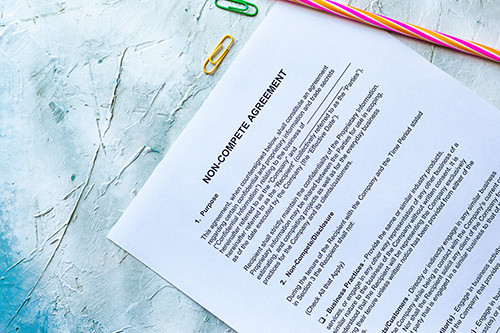
A bill working its way through the Michigan House of Representatives would impose new requirements on businesses that enter into noncompete agreements with their employees.
Proposed Law Imposes New Burdens on Employers
Noncompete agreements are a popular way for businesses to protect themselves against the threat of former employees sharing important information with competitors. Generally, these agreements specify that an employee may not compete with their employer for business, and they typically prohibit the employee from revealing proprietary information to others, even after their employment ends
For decades, Michigan has recognized noncompete agreements as legal, so long as they are “reasonable” in “duration, geographical area, and the type of employment or line of business.”[1] For example, Michigan courts have upheld noncompete restrictions that blocked employees from competing with their employer within 100 miles of the company for a period of one year after termination of employment.[2]
Michigan House Bill 4399 would set a new standard for noncompete agreements. Under the proposed law, employers would be prohibited from entering into noncompete agreements unless they first:
- Provide each applicant for the position with written notice of the requirement for a noncompete agreement;
- Disclose to the employee or applicant the written terms of the noncompete agreement; and
- Post the new law or a summary of its requirements in a conspicuous place at the worksite where it is accessible to employees.
Any noncompete agreement obtained in violation of HB 4399 would be void and unenforceable, according to the bill. Additionally, the proposed law would void and render unenforceable any noncompete agreement that attempts to waive the new requirements, or which seeks to apply the law of a different state—i.e., one with more lenient standards.
Steep Costs for Employers
HB 4399 could impose severe penalties and other costs on employers. For example, employers that obtain a noncompete agreement from “low-wage” employees would be subject to a $5,000 civil fine, and if a court were to void or limit an employer’s noncompete agreement, the employer would be required to pay:
- The actual costs of the legal action, including attorneys’ fees, to the employee and any other injured party; and
- All income the employee lost as a result of “actual or threatened enforcement” of the agreement.
In any court action to enforce or limit a noncompete agreement, the employer would bear the burden of proving that (a) the employee was not a “low-wage” employee; and (b) the duration, geographical area, and type of employment or line of business under restriction are reasonable.
Takeaways for Small Businesses
As is often the case, an ounce of prevention is worth a pound of cure. Rather than risking steep costs and penalties associated with HB 4399, many employers—particularly those that use noncompete agreements—may want to consult with their employment attorneys about ways to protect valuable information while ensuring compliance with ever-changing requirements.
This article serves as a general informational summary and does not constitute legal advice. Please contact the authors with any specific questions.
About the Authors:
Frank Mamat is a partner at Dinsmore & Shohl LLP who focuses his practice on labor and employment. Frank is prepared to respond when employers face complex issues, and he understands the importance of addressing these matters in a timely, efficient manner. You may reach Frank at frank.mamat@dinsmore.com or (248) 203-1635
Erik Bradberry is an attorney at Dinsmore & Shohl LLP whose practice emphasizes labor and employment matters, as well as commercial litigation. You may reach Erik at erik.bradberry@dinsmore.com or (774) 773-4075.
[1] MCL § 445.774a(1).
[2] Coates v Bastian Bros, Inc, 276 Mich App 498, 507; 741 NW2d 539 (2007)